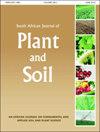Long-term effects of micro-fine and class A calcitic lime application rates on soil acidity and rooibos tea yields under Clanwilliam field conditions
IF 0.7
Q3 AGRONOMY
引用次数: 1
Abstract
Previous research on the effect of soil liming on rooibos tea growth was limited to short-term greenhouse trials. This is the first long-term field study to investigate the effect of lime application on rooibos tea production. Micro-fine and class A calcitic lime with similar levels of purity were applied at rates of 0, 0.5, 1.0, 2.0 and 5.0 tonnes ha−1 to a depth of 15 cm on an acid (pHKCl 4.4), sandy soil in Clanwilliam, prior to planting. Soil pH and electrical conductivity (EC), rooibos mortality and yields were then measured over a period of 4 years. Foliar nutrients were determined in Year 4. Micro-fine lime resulted in significantly higher soil pH values (0.5 pH units) than class A lime. Both limes achieved maximum soil pH and EC values in Year 2, but these values declined significantly in Years 3 and 4. This is most likely due to leaching and exhaustion of the most soluble lime fractions. Although micro-fine lime had positive effects on foliar nitrogen and calcium concentrations and bush survival, liming appeared to have a negative effect on rooibos tea yields. Yields tended to decline with increasing lime application rate. Thus, it appears that under the Clanwilliam field conditions in the present study, liming is unnecessary.Clanwilliam田间条件下施用微量和A类钙石灰对土壤酸度和rooibos茶产量的长期影响
先前关于土壤施石灰对鲁伊波斯茶生长影响的研究仅限于短期温室试验。这是第一次长期实地研究石灰对鲁伊波斯茶生产的影响。以0、0.5、1.0、2.0和5.0吨ha−1的速率施用纯度水平相似的超细和A级钙石灰,深度为15 在种植前,在Clanwilliam的酸性(pHKCl 4.4)沙质土壤上种植。然后在4年的时间里测量土壤pH值和电导率(EC)、rooibos死亡率和产量。在第4年测定了叶片营养成分。微细石灰导致土壤pH值显著升高(0.5 pH单位)。两种石灰在第二年都达到了最大土壤pH值和EC值,但在第三年和第四年这些值显著下降。这很可能是由于最易溶解的石灰部分的浸出和耗尽。尽管微细石灰对叶面氮、钙浓度和灌木存活有积极影响,但施石灰似乎对鲁伊波斯茶产量有负面影响。产量往往随着石灰施用量的增加而下降。因此,在本研究的克兰威廉油田条件下,似乎没有必要进行石灰处理。
本文章由计算机程序翻译,如有差异,请以英文原文为准。
求助全文
约1分钟内获得全文
求助全文
来源期刊

South African Journal of Plant and Soil
Agricultural and Biological Sciences-Plant Science
CiteScore
1.90
自引率
11.10%
发文量
32
期刊介绍:
The Journal has a proud history of publishing quality papers in the fields of applied plant and soil sciences and has, since its inception, recorded a vast body of scientific information with particular reference to South Africa.
 求助内容:
求助内容: 应助结果提醒方式:
应助结果提醒方式:


